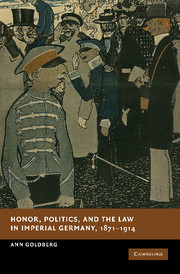Introduction
Published online by Cambridge University Press: 03 May 2010
Summary
Germans have long been a thin-skinned people, easily insulted and, when provoked, exceptionally ready to sue. Three anecdotes, spanning the seventeenth and twentieth centuries, give a sense of what was at stake in their lawsuits. The first is of a Saxon blacksmith in 1671 whose wife was called a “whore” (allegedly she had had sex for money with her male servant). For the dishonoring remark, made by a drunken tanner, the blacksmith filed charges and the tanner was called to court to account for his insult (though eventually acquitted). The second case, over 300 years later, is of the Berlin court actor Siegwart Gruder, a man whose successful career peaked during the Kaiserreich (1871–1918). Now, in 1927, aging, ill, and living off a meagre pension, he goes to the telephone exchange to complain about service, and has a fit when the woman at the desk fails to treat him with the respect he thinks he deserves (allegedly she didn't heed the sign he had made (Blinkzeichen) calling for her attention). Having called in her supervisor, Gruder blusters, “I am an academic [sic] and I don't have to let myself be treated like this by an uneducated vagrant street girl and daughter of a [mere] postman [Postschaffner].” This tiny moment of rancour became the basis subsequently of a court case, the state charging and convicting Gruder of insulting a civil servant (Beamtenbeleidigung).
- Type
- Chapter
- Information
- Publisher: Cambridge University PressPrint publication year: 2010



